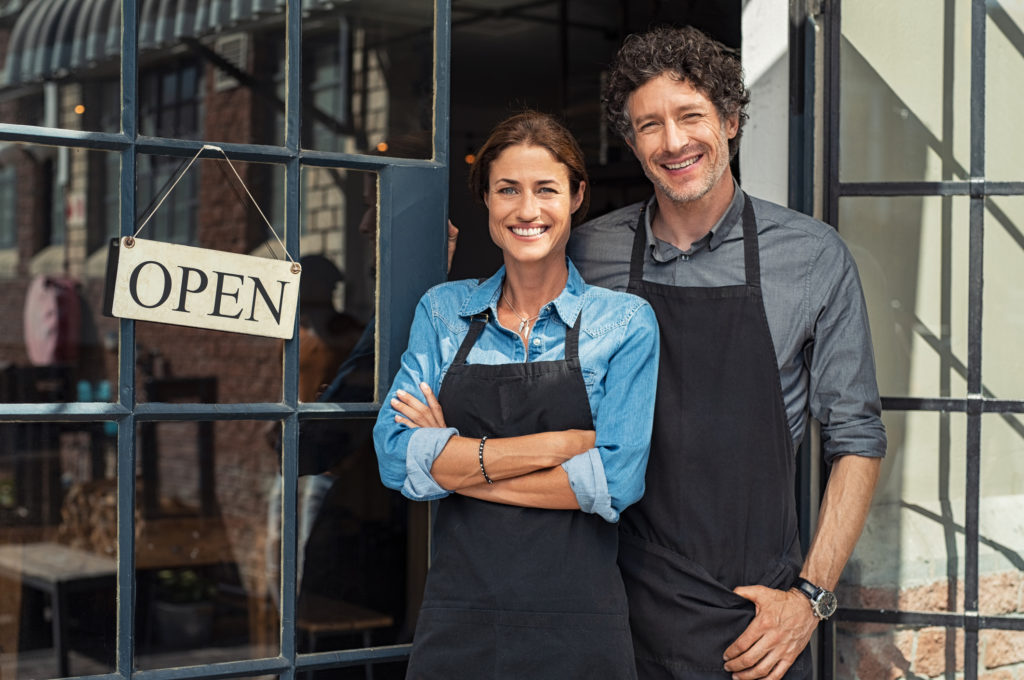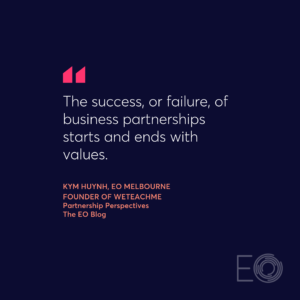 At their best, business partnerships can enrich your organization and your life. At worst, they ruin your business and drain your energy.
At their best, business partnerships can enrich your organization and your life. At worst, they ruin your business and drain your energy.
What makes a good partnership? What have been your best and worst partnerships—and what did you learn? Kym Huynh, founder of WeTeachMe and a member of EO Melbourne, recently surveyed a handful of entrepreneurs to glean their insights.
Plan as though it will fail because the odds are, it will.
Tony Falkenstein, founder and CEO at Just Life Group Limited, founder and CEO at Just Water and a member of EO New Zealand.
Many business partnerships are formed because your partner is your friend. Imagine you’re 21 and you’re considering partnering with a person who’s your buddy. The odds are against the partnership surviving. There are two inherent problems:
- If you both have the same skills, what have you achieved? You just have two payrolls to cover rather than one.
- Between the ages of 20 and 30, your life is full of changes. What you dream of when you are 21 is completely different to when you are 30. Once you have obligations such as a lifelong partner or children, you cannot afford to be living off the smell of an oily rag. In contrast, your business partner might be quite happy proceeding that way.
I am personally against business partnerships, at any age. It just becomes another hurdle to jump over, and you are always compromising, otherwise, you end up with resentment and as enemies.
If you must join a business partnership, the most important clause is the “exit” clause. Plan as though it will fail as the odds are, it will.
See the silver lining or the positive. It allows us to forgive and to not feel victimized.
Ai-Ling Wong, founder of The Decorateur and member of EO Malaysia
I inherited a nightmare of a business partner in my last family business, and this inspired me to start my new business.
What I have learned is that there is a silver lining in every cloud. I now thank them for what I have today (although they don’t know it). Due to that circumstance, I embarked on what I am truly passionate about.
There is no blame. Only learning.
Alex Louey, founder and managing director at Appscore and member of EO Melbourne
Nick Bell and I have been business partners for 10 years, and friends for much longer. The key to our success is that our friendship is stronger than our business partnership.
We’ve had our disagreements but we are: (1) prepared to not let our ego drive our decisions; (2) prepared to let the other take the lead; and (3) if one is wrong or fails, we consider it just part of the journey. There is no blame; only learning.
There are going to be ups and downs, and sometimes when things are down they can really be down. To know that you are working with someone that “has your back” strengthens and bolsters you, makes you brave and makes it easier to overcome the inevitable challenges. Business is like a sport and a champion team will always beat a team of champions.
The worst business partnership I have witnessed occurred when greed, ego and jealousy overshadowed the goal of creating a great business where both partners are successful. The result? One business partner walked away because they decided the negativity in their life wasn’t worth a few million dollars.
When I was presented with an opportunity to walk away, I did. It was the best thing I ever did.
Andrea Grisdale, founder and CEO at IC Bellagio and member of EO Italy
A few years ago, despite having some previous negative experience with the same business partner, I went against my gut feeling and agreed to a new joint partnership that on paper was: (1) a match made in heaven; (2) an easy way into companies from both a commercial and positioning point-of-view.
What was sold to me did not match reality, so when I was presented with an opportunity to walk away, I did—and it was the best thing I ever did.
When your gut tells you to walk away, do it, no matter how attractive the situation or how many people tell you otherwise.
Partnerships that are based on shared values and mutual trust are what I admire and strive for.
Daniel Dickson, managing director at Amarco Enterprises and member of EO Sydney
Partnerships that are based on shared values and mutual trust are what I admire and strive for.
Every good supplier or customer relationship that I have experienced has been one that was mutually beneficial: where both parties are heading in the same direction with the same goals, and both have a desire for each other to be successful. They also understand what success looks like for each other.
A trick to noticing and recognizing an unsuccessful partnership or business relationship is when you feel that the other partner is working against you or is not sharing and practicing the same values that you believe in. In these two scenarios, the business relationship is not mutually beneficial, and the partnership will not be successful.
The importance of living and breathing the values cannot be understated, and one should never steer off the concept of values-based decision making.
The best partnerships are where both parties spend the time to help one another succeed.
David Fastuca, founder at Ambisie and Locomote and a member of EO Melbourne
Partnerships are like marriages. They start with the best intentions but the spark that once started the relationship can wear off. That’s when things start to break down. Like a good marriage, partnerships require work from both sides.
Whenever I have experienced a partnership break-down, it was due to one side always asking and taking without giving. Over time you start to feel used and then you despise the relationship.
The best partnerships are where both parties spend the time to help one another succeed. It takes work and takes time but like all great long-lasting partnerships, it can be worth it.
 The success, or failure, of business partnerships starts and ends with values.
The success, or failure, of business partnerships starts and ends with values.
Kym Huynh, founder at WeTeachMe and a member of EO Melbourne
When there is an alignment of values, there is a strong foundation of trust and respect, an environment with ample opportunity for building deeper bonds, and as a result, a resilience for weathering the inevitable storms that will come.
Building a business, when there is a misalignment of values, is akin to building a fortress, that is perched on top of a haphazard rickety wooden stand, on an ever-changing sandy shoreline. Communication becomes more difficult, and this breeds an environment where anger and resentment festers. In this scenario, nobody wins.
When I assess potential business partnerships, the questions I ask myself are:
- Are the lens through which I and my potential business partner look at the world the same?
- Are the rules by which I and my potential business partner live and experience life the same?
- Are the methods in which I and my potential business partner make decisions, guided by a similar set of values?
- Do I and my potential business partner live and breathe a similar set of values?
- What are the differences between my values and that of my potential business partner? Can these difference in values peacefully coexist?
- What are the things I admire and don’t admire, about my potential business partner? If I dig deeper, what values do they hint at or uncover? Are the differences cogent with my values?
Building a business requires a tremendous amount of time and energy. Shared values are critical, and form the foundation of what one builds. If I am to make the decision to spend a tremendous amount of time and energy, to ensure that they do not go to waste, I’ll make sure to get the foundations (values) right first and foremost.
The best business partnership for me occurred when partnering with people that had completely opposite skill sets.
Ron Lovett, founder and chief alignment officer at Connolly Owens, founder and chief community officer at Vida Living and a member of EO Atlantic Canada
I previously owned a construction company and my partner focused on construction, margins, operations and the management of suppliers whereas I focused on strategy, business development, HR and finance. This worked well! I’ll never partner with someone who has a similar set of skills to me.
The worst partnerships I have experienced were due to not fleshing out our long-term vision (an exit strategy, for example) and not turning our eyes to our values from day dot. These have caused breakups for me within the first 12 months.
The most powerful gift my business partner gave me was the experience of depth rather than breadth.
Tui Cordemans, founder at Koh Living and member of EO Melbourne.
Because I had someone who both relied on me and gave me much, I did not have the option to jump ship whenever I wanted a new experience.
This partnership taught me that one gains the most out of life when one goes deep and some of my learnings from this (resilience and how to live a life of meaning) is priceless.
For more insights and inspiration from today’s leading entrepreneurs, check out EO on Inc. and more articles from the EO blog.
Categories: BUSINESS GROWTH LEADERSHIP

